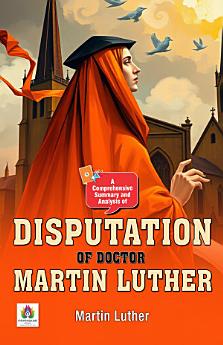A Comprehensive Summary and Analysis of Disputation of Doctor Martin Luther by Martin Luther: Demanding Ebook Book
About this ebook
In his 95 Theses, Luther articulates his central argument that salvation cannot be bought or sold, but is a gift from God that comes through faith and genuine repentance. He emphasizes the importance of Scripture over Church traditions, challenging the Church’s authority and advocating for a direct relationship between the believer and God. Luther's use of theological reasoning, paired with a strong moral conviction, set the stage for profound changes in Christian doctrine and practice.
Each thesis presents a specific objection to the indulgence system and broader ecclesiastical practices. Luther raises questions about the validity of indulgences, criticizes the exploitation of the faithful by clerics, and urges reform within the Church. Through his eloquent arguments, he seeks to awaken a sense of moral responsibility among Christians and calls for the Church to return to its biblical foundations. The document was revolutionary not only in its content but also in its accessibility, as Luther's method of disseminating the theses via printing technology made them widely available and sparked widespread debate.
The 95 Theses ultimately marked the beginning of a significant shift in Christian thought, leading to the emergence of various Protestant denominations and the decline of papal authority. Martin Luther’s challenge to the status quo resonated across Europe, igniting theological discussions and grassroots movements that questioned the very nature of faith, governance, and the Church itself. As a lasting testament to the power of written expression, the Disputation of Doctor Martin Luther remains a profound exploration of faith, authority, and the quest for spiritual authenticity.
About the author
Martin Luther was a seminal figure in Western Christianity and the Protestant Reformation, best known for his influential work, the Disputation of Doctor Martin Luther on the Power and Efficacy of Indulgences, or the 95 Theses. His critiques of the Catholic Church's corrupt practices, particularly the selling of indulgences, ignited a theological reawakening that challenged long-standing religious and societal norms. Luther's writings emphasized the importance of faith, morality, and individual access to divine grace, leading to the creation of numerous Protestant denominations and a reexamination of Christian beliefs. Through his courageous actions and profound insights, Martin Luther reshaped the course of Christian history and remains a pivotal figure in discussions about faith, ethics, and the nature of authority in religion.







